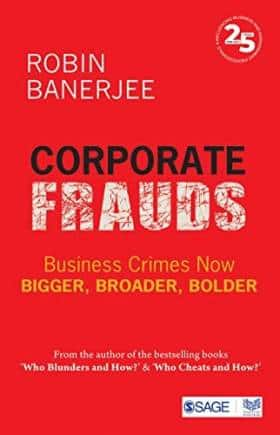



Why do rich and powerful people commit acts of fraud? Are they driven by insatiable greed, or is it a momentary lapse of judgement that makes them deceive others? Do their actions simply come from over-confidence, or perhaps a belief that they can escape all consequences? Can we see look at these events through an economic lens instead of a moral or ethical one?
If these questions interest you, read Robin Banerjee’s book Corporate Frauds: Business Crimes Now Bigger, Broader, Bolder (SAGE India, 2022). He is the MD and CEO of Caprihans India Ltd. He has written two books earlier – Who Cheats and How? Scams, Fraud and the Dark Side of the Corporate World (2015) and Who Blunders and How: The Dumb Side of the Corporate World (2019). The underbelly of corporate India is his writerly playground. Corporate Frauds has 12 chapters, excluding the introduction and epilogue. It classifies white-collar crimes that involve “violation of delegated trust” into many categories. Some of these are accounting artifice, banking deceits, Ponzi schemes, stock market swindles, corruption, insurance imposture, hiding shady wealth, impersonation, and cybercrimes. He does not glorify them as clever masterminds; he highlights their practices as bad for business.How did Banerjee come to be so deeply interested in the subject of this book?He attributes his “early learnings of good governance” to Hindustan Unilever, the company that he used to work for. There were many instances wherein the organization refused to “grease the palms of the powers that be” to gain early permissions. This was during the License Raj, when corruption flourished due to excessive government control and interference. Banerjee’s employer at the time “indoctrinated” him into “doing business fairly, providing customers with goods and services of consistent quality at appropriate price.”One of the scandals discussed in the book has to do with inconsistencies in the accounts at Satyam Computer Services. These inconsistencies went undetected till the company founder B. Ramalinga Raju copped to cooking the books in January 2009. When the truth was uncovered, India had to “overhaul its corporate oversight laws.” This paved the way for the Companies Act, 2013, to prevent similar frauds in the future and to increase transparency. This law put in place “more stringent disclosure requirements by the directors, including independent board members and auditors.” Rotation of auditors became mandatory. Stricter penalties were imposed for fraud.Instead of milking such stories for all their tantalizing details, Banerjee opts for a more constructive approach. His ability to show how frauds like this have changed the way we do business is remarkable. While discussing “corporate malfeasance” in the case of Vijay Mallya, ex-CEO of Kingfisher Airlines, Banerjee notes that this fraud in particular has led to “tougher Indian banking norms, like prohibition on ever-greening (lending new money to pay back old money) of irrecoverable loans and proper disclosure by banks of bad loans.”Another example that comes up in the book has to do with alleged insider trading by Prannoy Roy and Radhika Roy of NDTV who were temporarily barred by the Securities and Exchange Board of India (SEBI) from accessing the securities market. Banerjee uses this case as an entry point into SEBI’s statutory regulations to prohibit insider trading and the “widened information access rights” that empower the regulatory body to now access call data records and records of employees’ personal details, besides scouring social media platforms for information.You will find many other big names – people and corporations – that find mention in this book. Some of them are Chanda Kochhar of ICICI Bank, Rajat Gupta of Goldman Sachs, Paras Shah of Citibank, and Jignesh Shah of Financial Technologies India Limited. Banerjee is not merely descriptive. He wants you to know how fraudsters work so that you can protect yourself from being fooled or misled by the people you do business with.
Corporate Frauds has 12 chapters, excluding the introduction and epilogue. It classifies white-collar crimes that involve “violation of delegated trust” into many categories. Some of these are accounting artifice, banking deceits, Ponzi schemes, stock market swindles, corruption, insurance imposture, hiding shady wealth, impersonation, and cybercrimes. He does not glorify them as clever masterminds; he highlights their practices as bad for business.How did Banerjee come to be so deeply interested in the subject of this book?He attributes his “early learnings of good governance” to Hindustan Unilever, the company that he used to work for. There were many instances wherein the organization refused to “grease the palms of the powers that be” to gain early permissions. This was during the License Raj, when corruption flourished due to excessive government control and interference. Banerjee’s employer at the time “indoctrinated” him into “doing business fairly, providing customers with goods and services of consistent quality at appropriate price.”One of the scandals discussed in the book has to do with inconsistencies in the accounts at Satyam Computer Services. These inconsistencies went undetected till the company founder B. Ramalinga Raju copped to cooking the books in January 2009. When the truth was uncovered, India had to “overhaul its corporate oversight laws.” This paved the way for the Companies Act, 2013, to prevent similar frauds in the future and to increase transparency. This law put in place “more stringent disclosure requirements by the directors, including independent board members and auditors.” Rotation of auditors became mandatory. Stricter penalties were imposed for fraud.Instead of milking such stories for all their tantalizing details, Banerjee opts for a more constructive approach. His ability to show how frauds like this have changed the way we do business is remarkable. While discussing “corporate malfeasance” in the case of Vijay Mallya, ex-CEO of Kingfisher Airlines, Banerjee notes that this fraud in particular has led to “tougher Indian banking norms, like prohibition on ever-greening (lending new money to pay back old money) of irrecoverable loans and proper disclosure by banks of bad loans.”Another example that comes up in the book has to do with alleged insider trading by Prannoy Roy and Radhika Roy of NDTV who were temporarily barred by the Securities and Exchange Board of India (SEBI) from accessing the securities market. Banerjee uses this case as an entry point into SEBI’s statutory regulations to prohibit insider trading and the “widened information access rights” that empower the regulatory body to now access call data records and records of employees’ personal details, besides scouring social media platforms for information.You will find many other big names – people and corporations – that find mention in this book. Some of them are Chanda Kochhar of ICICI Bank, Rajat Gupta of Goldman Sachs, Paras Shah of Citibank, and Jignesh Shah of Financial Technologies India Limited. Banerjee is not merely descriptive. He wants you to know how fraudsters work so that you can protect yourself from being fooled or misled by the people you do business with. Discover the latest Business News, Sensex, and Nifty updates. Obtain Personal Finance insights, tax queries, and expert opinions on Moneycontrol or download the Moneycontrol App to stay updated!
Find the best of Al News in one place, specially curated for you every weekend.
Stay on top of the latest tech trends and biggest startup news.